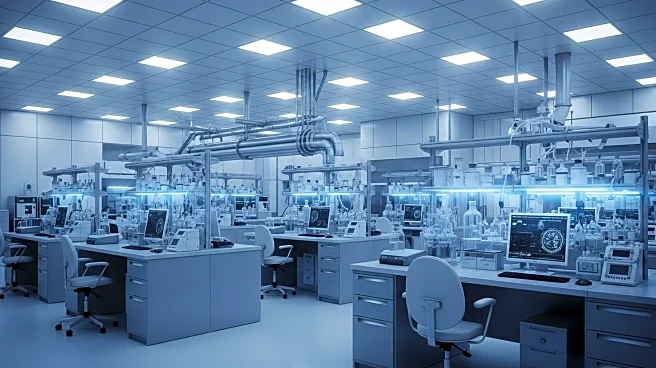What's Happening?
Gilead Sciences and Amgen have commenced significant capital investments in new facilities in the United States, marking a strategic move to enhance their manufacturing and research capabilities. Gilead has initiated construction on a manufacturing hub at its Foster City site in California, which is part of a $32 billion investment plan aimed at strengthening its U.S. growth and innovation strategy. This facility will feature advanced digital infrastructure, including robotics and real-time digital monitoring, and is expected to create over 3,000 jobs. Amgen, on the other hand, plans to invest more than $600 million in a new center for science and innovation at its global headquarters in Thousand Oaks, California. This facility will focus on accelerating the discovery of next-generation therapeutics and will also create hundreds of jobs. These investments are part of a broader trend among pharmaceutical companies to onshore manufacturing in response to pressure from President Trump to avoid tariffs on imported medicines.
Why It's Important?
The investments by Gilead and Amgen are significant for the U.S. biopharmaceutical sector, as they promise to enhance the country's leadership in global biopharma innovation. By expanding their manufacturing and R&D capabilities domestically, these companies are not only creating thousands of jobs but also contributing to the U.S. economy. The move aligns with broader industry trends of onshoring production to mitigate risks associated with international trade tariffs and supply chain disruptions. Additionally, these facilities are expected to advance the development of next-generation biologics and therapeutics, potentially leading to breakthroughs in treating serious diseases. This strategic shift could also influence other pharmaceutical companies to follow suit, further bolstering the U.S. position in the global biopharma market.
What's Next?
As construction progresses, both Gilead and Amgen will likely focus on integrating advanced technologies and automation into their new facilities to enhance research and manufacturing efficiency. The completion of these projects will be closely watched by industry stakeholders, as they could set new standards for biopharmaceutical innovation and collaboration. Furthermore, the success of these investments may encourage other companies to increase their U.S. presence, potentially leading to more job creation and economic growth. Stakeholders, including policymakers and industry leaders, will be interested in the outcomes of these investments, particularly in terms of job creation and technological advancements.
Beyond the Headlines
The decision by Gilead and Amgen to invest heavily in U.S. facilities reflects broader ethical and economic considerations, such as the importance of supporting domestic job creation and reducing dependency on foreign manufacturing. This shift may also have long-term implications for the U.S. healthcare system, as increased local production could lead to more affordable and accessible treatments. Additionally, the focus on next-generation biologics and therapeutics highlights the industry's commitment to addressing complex health challenges, potentially leading to significant advancements in medical science.










